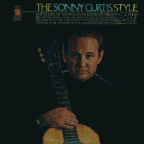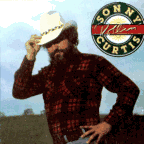![]() Sonny Curtis is an ex-rockabilly rebel who resurfaced for a modest country career... and some stunning successes as a pop songwriter. A former member of Buddy Holly's band, Curtis made some big bank as the composer of the "Mary Tyler Moore" theme song (see below), as well as the rebel-rock anthem "I Fought The Law," which has been covered by just about anyone you can imagine. His own recording career is kinda patchy, but what he's laid to wax is usually pretty good... Here's a quick look at his work....
Sonny Curtis is an ex-rockabilly rebel who resurfaced for a modest country career... and some stunning successes as a pop songwriter. A former member of Buddy Holly's band, Curtis made some big bank as the composer of the "Mary Tyler Moore" theme song (see below), as well as the rebel-rock anthem "I Fought The Law," which has been covered by just about anyone you can imagine. His own recording career is kinda patchy, but what he's laid to wax is usually pretty good... Here's a quick look at his work....
Sonny Curtis "Beatle Hits Flamenco Style Guitar" (El Records, 1964)
![]() Sonny Curtis "The 1st Of Sonny Curtis" (Viva Records, 1968) (LP)
Sonny Curtis "The 1st Of Sonny Curtis" (Viva Records, 1968) (LP)
(Produced by Snuff Garrett)
I guess this was his debut as a singer-songwriter, an even dozen original songs, including his version of "I Fought The Law" and "Walk Right Back" (which was a big hit for the Everly Brothers...) The arrangements are pretty light and poppy, many with sparse, acoustic backing that verges on folk-pop, and a couple that have zippier rock-pop riffs -- not a lot of overt country twang, though. The groovy pop-a-delic rave-up rendition of "I Fought The Law" is a highlight -- almost sounds like something off the first Tremeloes album. Also of interest are three tracks co-written with piano player Glen D. Hardin, best known for his tenure in Elvis Presley's TCB band, and for his work with the Emmylou Harris Hot Band in the 1970s. I guess this disc was made a couple of years before he started working for Elvis, and was working as a session player and songwriter. Anyway, this is funny album, with Sonny Curtis more in a pop mode than on his later albums, but still quite enjoyable.
 Sonny Curtis "The Sonny Curtis Style" (Viva Records, 1969) (LP)
Sonny Curtis "The Sonny Curtis Style" (Viva Records, 1969) (LP)
(Produced by Snuff Garrett)
This is an odd, though oddly compelling album, with Curtis idly strolling through a set of somewhat notional song-sketches, sparsely arranged, briskly strummed little ditties that come off like either publishers demos or devil-may-care folkie indulgence. Although there are only a couple of songs that feel like they could have been pitched to stars as potential hits, the funny thing is that all the tracks are intriguing on one level or another. It's certainly a timely album: several songs grapple with the changing social scene in hippie-era America, and Curtis gives us a good feel for how deeply the druggy, free-sex and mental-liberation ideals of the counterculture had penetrated into the heart of conservative Nashville. On the opening track, "The Straight Life," he muses dreamily about dropping out and moving to some tropical island where he can get high and have some pretty girl attend to his every need... In the end, though, he hedges his bets and says it's just a fantasy, but these themes pop up on several songs, and (shocking for the time) he actually uses the term "get high" in a way that was clearly aimed at longhaired listeners. Even more fascinating is Curtis's attempt to address the nascent feminist movement on "How Little Men Care," which paints an Eleanor Rigby-like portrait of a woman who's been abandoned by a thoughtless lover -- it's not a political anthem, exactly, but an unusual attempt to see the world from a female point of view. Some of the most casual, tossed-off tunes explore a familiar country there: being down and out in Nashville, and trying to make it big in show biz. A genuine success, Curtis knows a thing or two about this topic, and though "This Is The Last Song I'm Ever Gonna Sing" isn't particularly strong musically, its rueful message rings true. Even more pointedly on "The Gig," Curtis mercilessly dissects the career death of an old-school rock'n'roller who couldn't make the psychedelic scene and finds fame fleeting when his fickle fans go off looking for new kicks. There's only one track on here that was written by someone else, Chris Gantry's "Atlanta Georgia Stray," a wistful countrypolitan ballad about a romance born on a Greyhound bus ride which was also released as a modestly successful, Back Forty single. The most substantive songs on here are "(You've Got) Nothin' To Be Ashamed Of" and "I Hate To See Me Go", though I don't think any of the material on here really went anywhere. However, threaded through the album is a nimble melodic undertone which, in retrospect, was the precursor to one of his most successful songs, Love Is All Around," which was released as a single the next year, and was used (of course) as the theme to the Mary Tyler Moore Show. The session musicians aren't listed on the record, though really it's mostly just Sonny Curtis and his guitar, with only the most bare-bones backing. But it is an intriguing album, definitely worth a spin.
Sonny Curtis "Sonny Curtis" (Elektra Records, 1979) (LP)
(Produced by Hitmen Productions, Inc.)
Sonny Curtis "Love Is All Around" (Elektra Records, 1980) (LP)
 Sonny Curtis "Rollin' " (Elektra Records, 1981) (LP)
Sonny Curtis "Rollin' " (Elektra Records, 1981) (LP)
(Produced by Thompson, Osborn & Young)
On this album, Curtis landed his highest-placed country hit (at #15 on the charts) with "Good Ol' Girls," a cheerful barroom singalong that recalls Moe Bandy's best work. The rest of this album is much softer, but for some mysterious reason, it's soft-country crooning that works -- really well! Maybe it's because Curtis is singing from the heart, with conviction rather than calculation or desperation... ("But wait!" you say, "Doesn't he do a cover of that horrible Leo Sayer song, 'Love You More Than I Can Say," on Side Two of the album?" Well, yes, he does, except that he, Sonny Curtis wrote that song, and his version is a lot less noxious than the pop radio hit... And Sayer copped it from Bobby Vee... ) Anyway, if you like Don Williams, or Bill Phillips' later work, track this disc down. It's nice.
Sonny Curtis "Sonny Curtis" (Aspirion Records, 2007)

